1. Overview
Robinson José Canó Mercedes is a Dominican-American professional baseball second baseman who achieved significant success in Major League Baseball (MLB) before his career was complicated by performance-enhancing drug (PED) suspensions. Beginning his MLB career with the New York Yankees in 2005, Canó quickly established himself as one of the league's premier players, contributing to the Yankees' 2009 World Series championship. He earned numerous accolades, including eight MLB All-Star selections, five Silver Slugger Awards, and two Gold Glove Awards. Canó further distinguished himself internationally, leading the Dominican Republic to an undefeated championship in the 2013 World Baseball Classic, where he was named the tournament's Most Valuable Player (MVP). Following a highly lucrative contract with the Seattle Mariners, his career faced substantial challenges, including an 80-game suspension in 2018 for furosemide and a full 162-game suspension in 2021 for stanozolol. These violations significantly impacted his legacy and led to his departure from MLB, though he has continued to play professional baseball in leagues such as Baseball United and the Mexican League, where he has demonstrated continued hitting prowess.
2. Early Life and Background
Robinson Canó's early life was shaped by a strong baseball heritage and exposure to both Dominican and American cultures.
2.1. Childhood and Education
Born on October 22, 1982, in San Pedro de Macorís, Dominican Republic, Robinson José Canó Mercedes was named after the legendary baseball player Jackie Robinson. His father, José Canó, was also a professional baseball player, having signed with the New York Yankees in 1980 and later pitching six games for the Houston Astros in 1989 after stints in the Yankees' and Atlanta Braves' minor league systems.
Canó spent his formative years primarily in the Dominican Republic but also lived in New Jersey for three years during his childhood. He attended Newark School System for seventh, eighth, and ninth grades, including one year at Barringer High School. When his family returned to the Dominican Republic, he attended San Pedro Apostol High School in San Pedro de Macorís, where he actively participated in both baseball and basketball teams. In the Dominican Winter Baseball League, he played for his hometown team, the Estrellas Orientales, a connection he maintains, serving as their captain.
3. Professional Career
Robinson Canó's professional baseball career began in the minor leagues, leading to a distinguished but ultimately controversial tenure in Major League Baseball, followed by continued play in international leagues.
3.1. Minor League Career
After graduating from high school, Canó signed with the New York Yankees as an amateur free agent on January 5, 2001, receiving a signing bonus exceeding 100.00 K USD. He began his professional career in the Yankees' minor league system that same year, playing for the Rookie-level Gulf Coast Yankees and the Low-A Staten Island Yankees of the New York-Penn League. In 2002, he continued to play for Staten Island and the Single-A Greensboro Bats of the South Atlantic League, where he was named a South Atlantic League All-Star at shortstop. By 2003, playing for the High-A Tampa Yankees and the Double-A Trenton Thunder of the Eastern League, Canó was recognized as a top prospect and appeared in the All-Star Futures Game.
Canó was a significant prospect for the Yankees, notably being one of five players offered to the Texas Rangers as part of a package for Alex Rodriguez before the 2004 season, though the Rangers ultimately chose Joaquín Árias instead. The Yankees also moved Canó to third base to showcase him for the Royals when they sought Carlos Beltrán, and later attempted to trade him to the Arizona Diamondbacks for Randy Johnson. He started the 2004 season with Trenton before being promoted to the Triple-A Columbus Clippers of the International League, where he also began the 2005 season.
3.2. Major League Baseball (MLB)
Robinson Canó's MLB career spanned over a decade, marked by exceptional performance and significant controversy across multiple teams.
3.2.1. New York Yankees (2005-2013)
Canó was called up to the major leagues on May 3, 2005, taking over the second base position from Tony Womack. He was hitting 0.330% in 108 at-bats with Columbus at the time of his call-up. On May 5, he recorded his first career base hit off Hideo Nomo of the Tampa Bay Devil Rays. During his rookie season, he also hit his first career grand slam. Canó finished second in the American League Rookie of the Year voting, behind Huston Street. Despite his offensive success, he concluded 2005 with a 3.0% walk percentage, among the league's lowest. Manager Joe Torre notably compared Canó to Hall of Famer Rod Carew, citing similarities in build, plate presence, and swing fluidity.
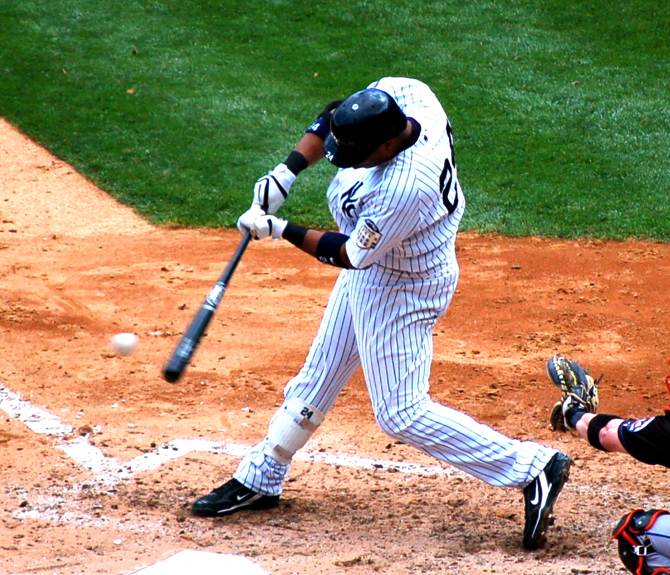
In 2006, Canó led the American League (AL) All-Star balloting at second base but was sidelined by a hamstring strain, preventing his participation. However, after his return, he led the league in batting average, doubles, and runs batted in by August 8. He was named AL Player of the Month for September. Canó finished the 2006 season with the AL's third-best batting average (0.342%), just two points behind teammate Derek Jeter, and ranked ninth in the league with 41 doubles. He also led the AL in road batting average (0.364%) and batting average after the sixth inning (0.353%). His walk percentage remained low at 3.6%. Canó received three votes for AL MVP.
For the 2007 season, Canó changed his jersey number from 22 to 24, a symbolic reversal of Jackie Robinson's number 42, in tribute to the baseball pioneer. After a slow start to the 2007 season, batting a meager 0.249% through May 29, Canó significantly improved in July, batting 0.385% with six home runs and 24 RBI, raising his season average to 0.300%. He concluded the year ranking sixth in the league in games played (160), ninth in triples (7), and tenth in hits (189), doubles (41), and at-bats (617), being the only batter in the AL top 10 for doubles in both 2006 and 2007. On January 24, 2008, Canó signed a four-year contract extension worth 28.00 M USD (2008-2011), with club options for 2012 and 2013 totaling 27.00 M USD. He struggled in April 2008, hitting only 0.151% with 7 RBIs, but rebounded from May through August, batting 0.300%. Canó recorded the final walk-off hit in Yankee Stadium history on September 20, 2008, with a game-winning single. The next day, he made the final RBI in the Stadium's history with a sacrifice fly, scoring the final run. Canó missed only five games across the 2007 and 2008 seasons and was one of only three Yankees to hit a home run as a pinch hitter.
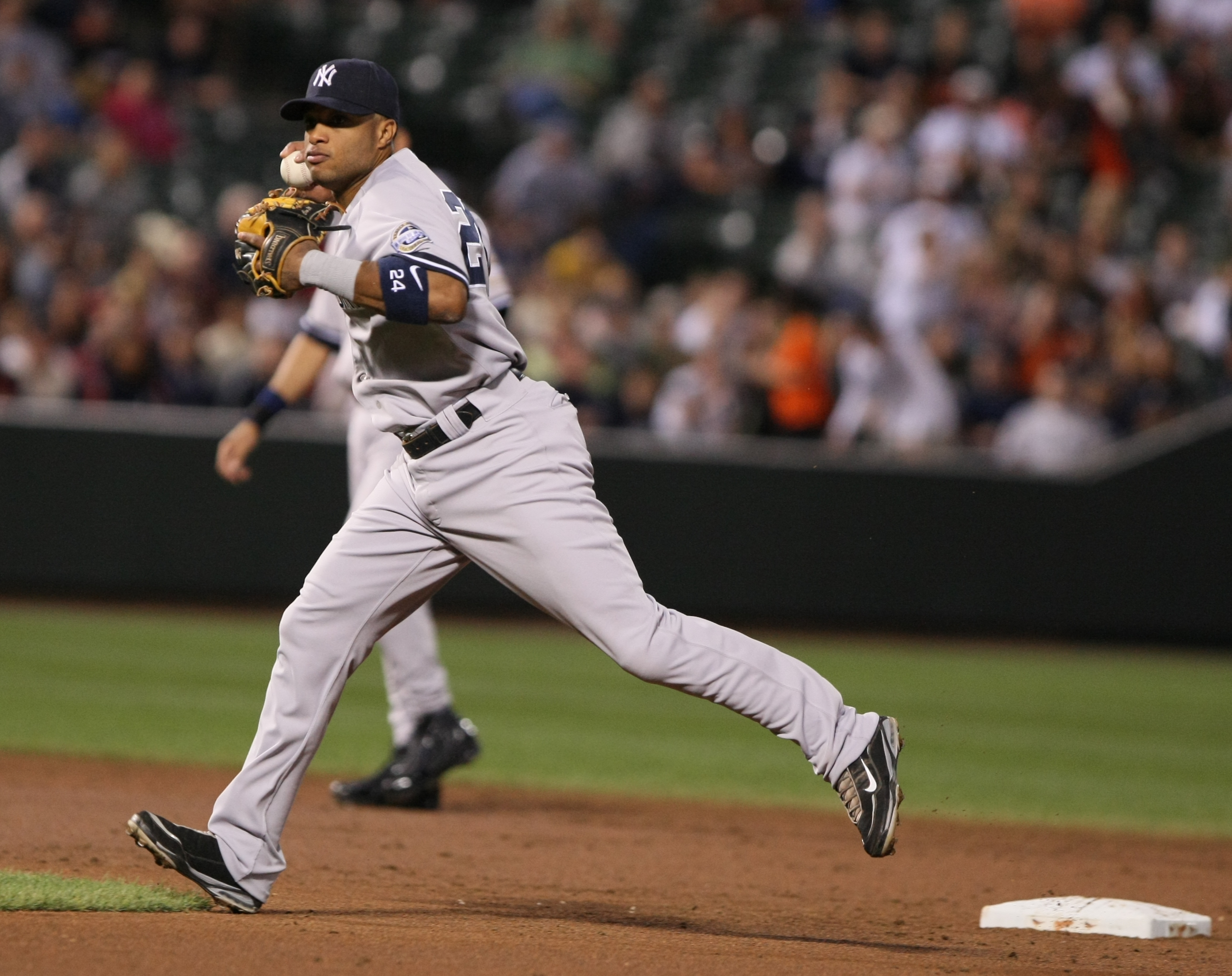
In 2009, Canó had a breakout season, batting 0.320% with 204 hits, 25 home runs, and 85 RBI, marking his first year with over 20 home runs. He ranked in the top ten in the American League in hits, extra-base hits, total bases, at-bats, doubles, batting average, runs scored, and triples. His 200th hit, which clinched the AL East Division against the Boston Red Sox, made him and Derek Jeter the first middle infield duo in MLB history to both record 200 hits in the same season. Canó's 204 hits were the most among all second basemen and ranked third overall in the AL. He also led all second basemen in batting average and played the most games in the AL (161). On August 28, he hit his first career walk-off home run, a three-run blast against the Chicago White Sox. On November 4, Canó threw out Shane Victorino for the final out of the 2009 World Series, securing the Yankees' championship.
With the departure of Hideki Matsui in 2010, Canó was moved to the fifth spot in the batting order. His early season performance earned him the AL Player of the Month award for April. He was elected as the starting second baseman in the 2010 MLB All-Star Game and was selected for the 2010 Home Run Derby, though he withdrew due to a minor injury. Canó finished the season with 200 hits and a career-high 109 RBIs. He notably improved his batting with runners in scoring position, performing effectively in the middle of the lineup. In the 2010 postseason, he batted 0.343% with four home runs and 6 RBIs. Defensively, Canó posted a .996 fielding percentage, the best for a second baseman in MLB, committing only three errors in 158 games, turning 114 double plays, and recording 341 putouts. He won the AL Gold Glove Award at second base, the first Yankee second baseman to do so since Bobby Richardson's five-year run from 1961 to 1965. He also won the AL Silver Slugger Award with a batting average of 0.319%, 29 home runs, and 109 runs batted in. He finished third in the AL MVP voting.
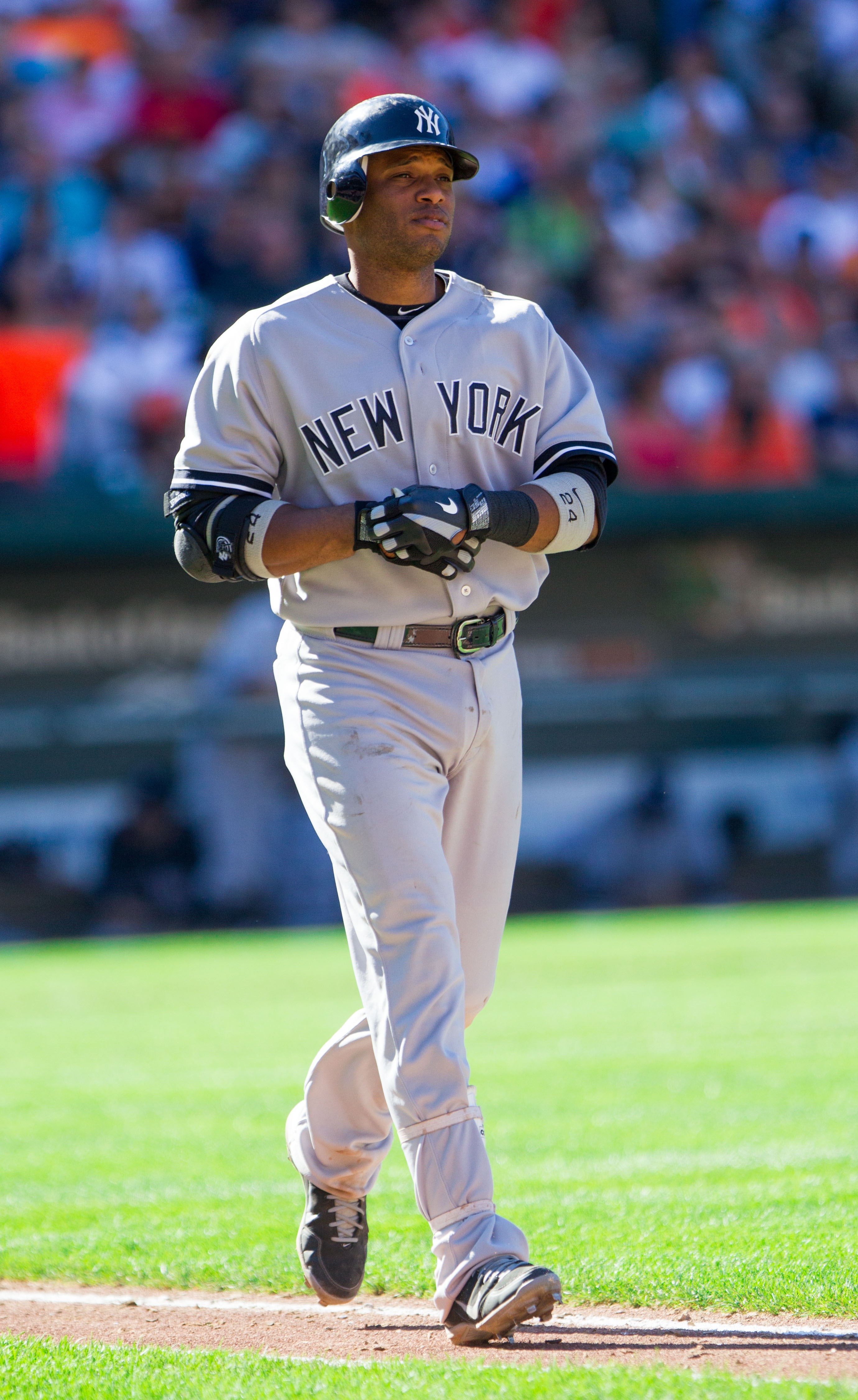
In the first half of the 2011 season, Canó struggled defensively, committing six errors by June 18, double his total from the previous Gold Glove-winning season. Despite this, he was selected as a starting second baseman for the 2011 MLB All-Star Game and participated in the 2011 Home Run Derby. With his father pitching to him, Canó won the Derby, setting a record with 12 home runs in the final round, with four outs remaining. On August 10 against the Los Angeles Angels of Anaheim, Canó fell just a single short of hitting for the cycle, marking the second time in his career he missed the cycle by a single (the first being in 2005). He concluded the 2011 season with 188 hits, 28 home runs, and a career-high 118 RBIs in 159 games. In Game 1 of the 2011 AL Division Series, Canó hit a grand slam, his fourth of the year (including regular season), contributing to his 6 total RBI for the game. The Yankees ultimately lost the series in five games to the Detroit Tigers.
Canó experienced a power surge in 2012, hitting only one home run in April but seven in May and a career-high 11 in June. He returned to compete in the 2012 Home Run Derby but failed to hit any home runs, finishing in last place. He was booed by Kansas City fans for not selecting the Royals' Billy Butler to participate, despite a previous statement that he would choose a Royal. Canó became the ninth player and first since Brandon Inge in 2009 to fail to hit a home run in the Derby. On July 20, he extended his career-high hitting streak to 23 games. He finished the last 10 games of the season strong, batting 0.615% (24-for-39) with three home runs, seven doubles, and 14 RBIs. Canó finished the 2012 season with a 0.313% batting average, 48 doubles, 33 home runs, and 94 RBIs. However, he struggled significantly in the postseason, batting 0.083% (3-for-36) over his first eight games in the 2012 AL Division Series and AL Championship Series, including a 29 at-bat hitless streak (the longest in a single postseason). His 2012 postseason average ultimately dropped to 0.075% (3-for-40). On October 29, the Yankees exercised Canó's club option for 2013, valued at 15.00 M USD.
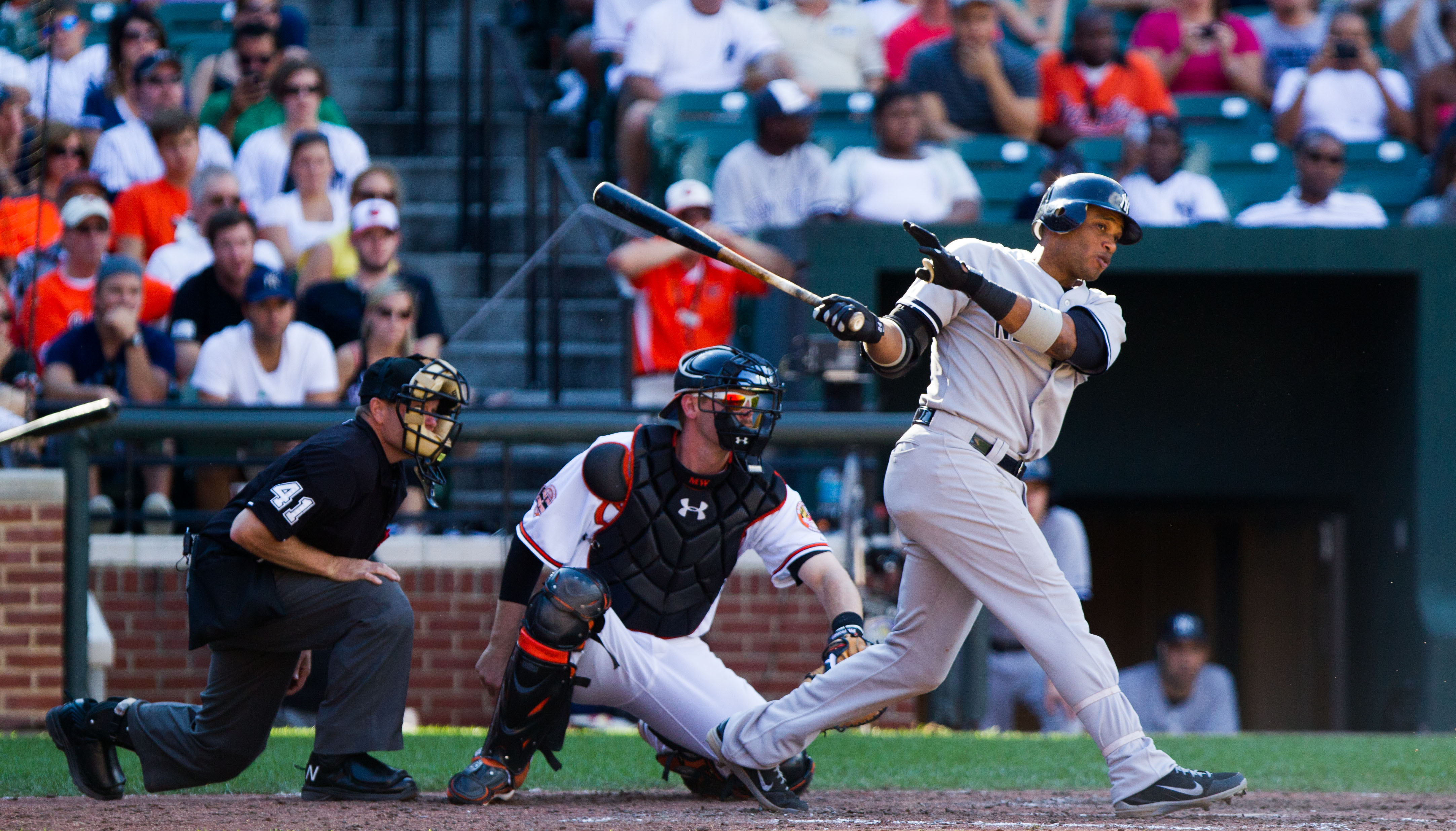
On April 13, 2013, Canó made his first career appearance at shortstop. He concluded the first half of the 2013 season with a 0.302% batting average, 21 home runs, and 65 RBIs. He was named the AL captain for the 2013 Home Run Derby. During his only plate appearance in the 2013 All-Star Game, he was hit by a pitch from Matt Harvey, sustaining a right quad contusion that forced him to exit the game after only two pitches. On August 20, Canó hit his 200th career home run, a three-run blast off Toronto Blue Jays pitcher Esmil Rogers at Yankee Stadium. For the entire 2013 season, Canó batted 0.314% with 190 hits, 27 home runs, and 107 RBIs in 160 games played.
3.2.2. Seattle Mariners (2014-2018)
In December 2013, Robinson Canó signed a significant 10-year, 240.00 M USD contract with the Seattle Mariners. This decision came after he declined a seven-year, 175.00 M USD offer from the Yankees, indicating his desire for a longer-term deal.
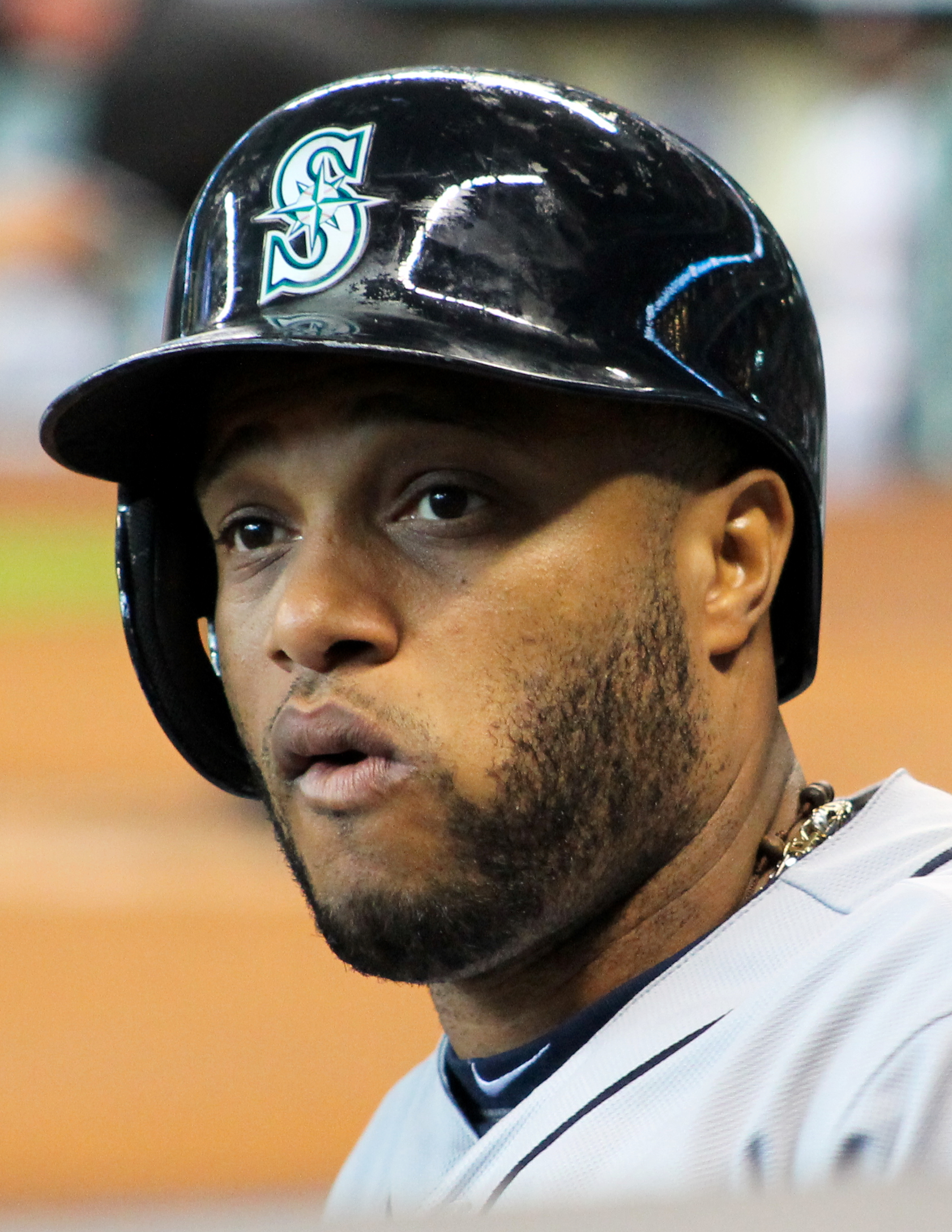
Canó made his Mariners debut on March 31, 2014, going 2-for-4 with a double, and recorded his first RBI for the team on April 2. On July 6, he was named the AL starting second baseman for the 2014 MLB All-Star Game, marking his sixth career All-Star selection and fifth consecutive start. He finished the season with a 0.314% batting average, 14 home runs, and 82 RBI. During August, he developed gastrointestinal symptoms that were later diagnosed as an intestinal parasite. Following the season, Canó participated in the 2014 Major League Baseball Japan All-Star Series against Nippon Professional Baseball All-Stars, where he fractured a toe, requiring 3-4 weeks to heal.
In 2015, Canó experienced acid reflux as a result of treatment for the parasite, which impacted his performance. He was not selected for the 2015 All-Star Game, ending his five-year streak. He batted 0.287% with 21 home runs, 34 doubles, and 79 RBIs in 156 games, but showed significant improvement in the second half of the season, batting 0.330%. He also tied for second in the AL in double plays grounded into (26). After the season, Canó underwent surgery to repair a sports hernia.
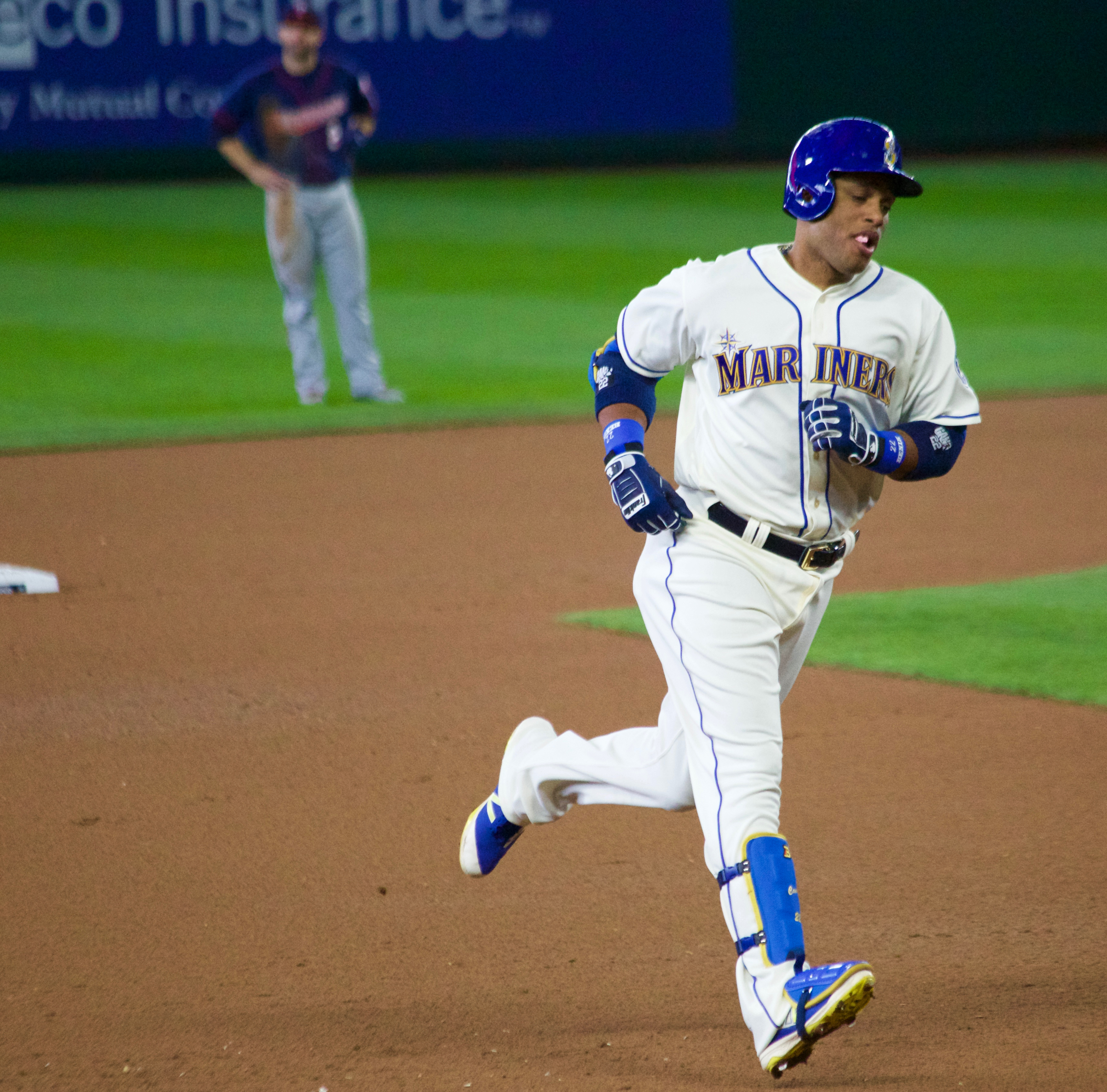
On May 7, 2016, Canó hit his 250th career home run, joining Joe Gordon and Jeff Kent as the only second basemen to reach this milestone within their first 12 career seasons. He was selected for his seventh All-Star Game, held at Petco Park in San Diego. On August 28, Canó hit his 30th home run of the season, marking the second time in his career he reached that mark. In 161 games, he finished the season with a 0.298% batting average, 195 hits, 33 doubles, a career-high 39 home runs, and 103 RBI.
On May 16, 2017, the Mariners placed Canó on the 10-day disabled list due to a right quadriceps strain, retroactive to May 13; this was only the second time he had been on the disabled list in his career. In the All-Star Game at Marlins Park, Canó hit a decisive home run in the top of the tenth inning off Wade Davis, securing a 2-1 victory for the American League and earning him All-Star Game MVP honors. On September 13, he was ejected for the first time in his career for arguing a strike call with umpire Vic Carapazza. Canó hit his 300th career home run on September 21 against Keone Kela of the Texas Rangers, making him only the third second baseman in history to reach this milestone, following Jeff Kent (377) and Rogers Hornsby (301). This home run also made him the 16th major leaguer to bat at least 0.300% with 2,000 hits, 1,000 runs scored, 1,000 runs driven in, and 500 doubles.
The 2018 season was significantly impacted by injury and suspension for Canó. On April 18, he hit his 302nd career home run against Lance McCullers Jr. of the Houston Astros, surpassing Rogers Hornsby for second place all-time among second basemen. On April 29, Canó hit his 100th home run as a Mariner. On May 13, he was hit by a pitch on the right hand, resulting in a fracture of the fifth metacarpal bone, forcing him out of the game. Two days later, on May 15, Canó was suspended for 80 games after testing positive for Furosemide, a diuretic which is a banned substance under MLB's performance-enhancing drugs policy. He returned to the Mariners on August 14 after serving his suspension. For the season, he batted 0.303% with a 0.374% on-base percentage and a 0.471% slugging percentage.
3.2.3. New York Mets (2019-2022)
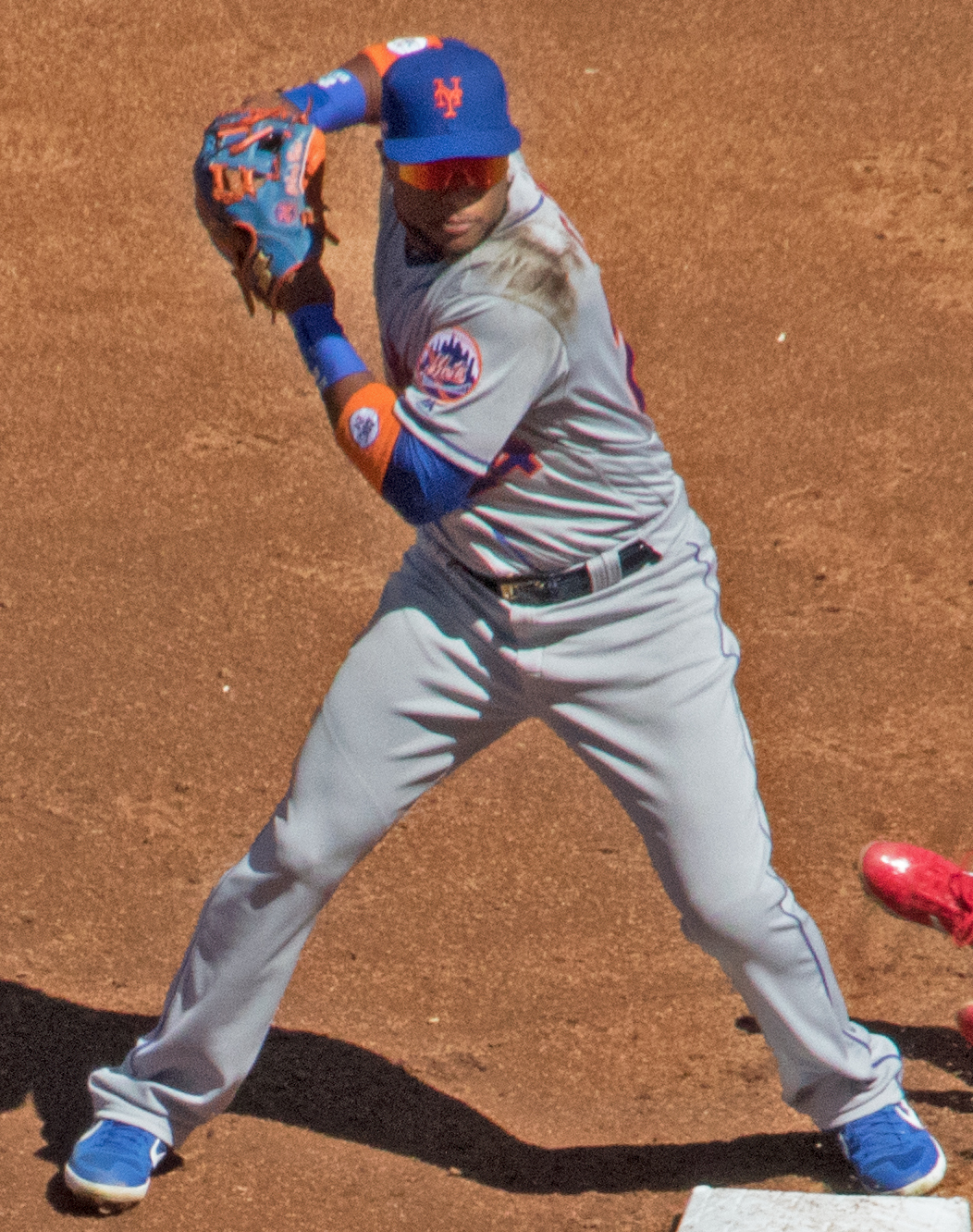
On December 3, 2018, the Mariners traded Canó, along with Edwin Díaz and 20.00 M USD in cash, to the New York Mets as part of a significant rebuilding process. In return, the Mariners received Jay Bruce, Jarred Kelenic, Anthony Swarzak, Gerson Bautista, and Justin Dunn.
In his very first at-bat as a Met, Canó hit a home run off Max Scherzer of the Washington Nationals on Opening Day. However, his first half of the 2019 season was challenging, marked by two stints on the injured list and a career-high strikeout rate. Critics like Mike Puma of the New York Post gave him an 'F' grade, and the trade for Canó was widely described by media as a "massive misstep" or an "unmitigated disaster." On July 23, Canó had his first career three-home-run game, driving in all five of the Mets' runs against the San Diego Padres. His performance improved significantly in the second half, where he posted an OPS of 0.880%, a notable increase from his 0.646% OPS in the first half. Overall in 2019, Canó batted 0.256% with a 0.307% on-base percentage and a 0.428% slugging percentage, hitting 13 home runs and a career-low 39 RBIs.
In the pandemic-shortened 2020 season, Canó experienced a resurgence. His batting line of 0.316% average, 0.352% on-base percentage, and 0.544% slugging percentage was the second-highest on the team in batting average and slugging percentage, and his 141 wRC+ (weighted Runs Created Plus) ranked fourth. This marked his best offensive season since leaving the Yankees in terms of OPS+ and wRC+. Following the 2020 MLB season, he played for the Dominican Republic in the 2021 Caribbean Series.
However, on November 18, 2020, Canó's career faced a severe setback when he was suspended for 162 games after testing positive for stanozolol, violating MLB's performance-enhancing drugs policy. This was his second positive test for a PED, rendering him ineligible for the entire 2021 season. Canó returned to the Mets for the 2022 season, but his performance was disappointing. On May 2, the Mets designated Canó for assignment after he batted only 0.195% with one home run in 41 at-bats, having received only sporadic playing time off the bench. He was released by the Mets on May 8, becoming a free agent, with the team still owing him nearly 45.00 M USD.
3.2.4. San Diego Padres (2022)
On May 13, 2022, shortly after his release from the Mets, Canó signed a major league contract with the San Diego Padres. His tenure with the Padres was brief and largely unsuccessful, as he batted just 0.094% in 12 games, recording 10 strikeouts in 34 plate appearances. He was released by the Padres on June 2. Despite this, he re-signed with the Padres on a minor league contract on June 10 and was assigned to the Triple-A El Paso Chihuahuas of the Pacific Coast League.
3.2.5. Atlanta Braves (2022)
On July 10, 2022, the Padres traded Canó to the Atlanta Braves for cash considerations, marking his third MLB team in the 2022 season. He made his Braves debut the following day against his former team, the New York Mets. However, his performance continued to decline, and the Braves designated Canó for assignment on August 1, after acquiring Ehire Adrianza. In his nine games with the Braves, Canó batted only 4-for-26 (0.154%). He was released on August 4, again becoming a free agent.
In aggregate, across his 33 games and 100 at-bats for three different MLB teams in 2022, Canó batted a combined 0.150% with a 0.183% on-base percentage and a 0.190% slugging percentage, along with 4 walks and 25 strikeouts. He also recorded the slowest sprint speed among major league second basemen that year, at 24.3 ft/s.
3.3. Post-MLB Career
After his final MLB stint in 2022, Robinson Canó continued his baseball career in international leagues.
3.3.1. Dubai Wolves (2023)
In September 2023, Canó expanded his involvement in baseball by joining the ownership group of Baseball United, a new professional baseball league based in Dubai. On October 23, 2023, he was selected as the sixth overall pick in the league's inaugural draft by the Dubai Wolves. During the league's first all-star showcase, Canó batted leadoff for the United West All-Stars in both games, achieving a combined 2-for-7 performance with two doubles and a walk.
3.3.2. Mexican League (2024-present)
On March 1, 2024, Robinson Canó signed with the Diablos Rojos del México of the Mexican League. In his first season with the club, he demonstrated a strong resurgence in his hitting, batting an impressive 0.431% with a 0.475% on-base percentage and a 0.639% slugging percentage. He hit 14 home runs and drove in 77 runs. Canó won the league's batting title and also led the league in hits. His contributions helped the Diablos Rojos del México win the Serie del Rey. On January 15, 2025, Canó re-signed with the Diablos for the 2025 season.
4. International Career
Robinson Canó has been a prominent figure in international baseball, representing his native Dominican Republic in multiple World Baseball Classic (WBC) tournaments.
He participated in four WBC tournaments: 2009, 2013, 2017, and 2023.
In the 2013 edition of the WBC, Canó delivered an exceptional performance, batting 0.469% (15-for-32). The Dominican Republic team went on to defeat Puerto Rico 3-0 in the finals, securing the championship and becoming the first team in the tournament's history to do so undefeated. Canó's outstanding play earned him the Most Valuable Player award for the Classic. Alongside his WBC teammates Octavio Dotel and Santiago Casilla, Canó became one of only four players at the time to have won both a World Series and a World Baseball Classic title. This exclusive group later expanded to include twelve more players, including David Robertson, with whom Canó won the 2009 World Series.
In the 2017 WBC, Canó was named the captain of the Dominican Republic team. After an initial 3-0 record in the first round, the Dominican Republic experienced their first loss to Puerto Rico in the second round, which ended their impressive 11-game winning streak that dated back to the 2013 World Baseball Classic. The team ultimately failed to advance to the championship round. Canó finished the 2017 tournament batting 0.300% (6-for-20) with one home run and 3 RBIs.
5. Career Statistics
Robinson Canó's career statistics reflect his consistent hitting ability and power, particularly during his prime years in MLB, followed by a period of decline and later a resurgence in the Mexican League.
5.1. Year-by-Year Batting Statistics
| Year | Team | Games | Plate Appearances | At-Bats | Runs | Hits | Doubles | Triples | Home Runs | Total Bases | RBIs | Stolen Bases | Caught Stealing | Sacrifice Bunts | Sacrifice Flies | Walks | Intentional Walks | Hit By Pitch | Strikeouts | Double Plays Grounded Into | Batting Average | On-Base Percentage | Slugging Percentage | OPS |
|---|---|---|---|---|---|---|---|---|---|---|---|---|---|---|---|---|---|---|---|---|---|---|---|---|
| 2005 | NYY | 132 | 551 | 522 | 78 | 155 | 34 | 4 | 14 | 239 | 62 | 1 | 3 | 7 | 3 | 16 | 1 | 3 | 68 | 16 | .297 | .320 | .458 | .778 |
| 2006 | NYY | 122 | 508 | 482 | 62 | 165 | 41 | 1 | 15 | 253 | 78 | 5 | 2 | 1 | 5 | 18 | 3 | 2 | 54 | 19 | .342 | .365 | .525 | .890 |
| 2007 | NYY | 160 | 669 | 617 | 93 | 189 | 41 | 7 | 19 | 301 | 97 | 4 | 5 | 1 | 4 | 39 | 5 | 8 | 85 | 19 | .306 | .353 | .488 | .841 |
| 2008 | NYY | 159 | 634 | 597 | 70 | 162 | 35 | 3 | 14 | 245 | 72 | 2 | 4 | 1 | 5 | 26 | 3 | 5 | 65 | 18 | .271 | .305 | .410 | .715 |
| 2009 | NYY | 161 | 674 | 637 | 103 | 204 | 48 | 2 | 25 | 331 | 85 | 5 | 7 | 0 | 4 | 30 | 2 | 3 | 63 | 22 | .320 | .352 | .520 | .871 |
| 2010 | NYY | 160 | 696 | 626 | 103 | 200 | 41 | 3 | 29 | 334 | 109 | 3 | 2 | 0 | 5 | 37 | 14 | 8 | 77 | 19 | .319 | .381 | .534 | .914 |
| 2011 | NYY | 159 | 681 | 623 | 104 | 188 | 46 | 7 | 28 | 332 | 118 | 8 | 2 | 0 | 8 | 38 | 11 | 12 | 96 | 18 | .302 | .349 | .533 | .882 |
| 2012 | NYY | 161 | 697 | 627 | 105 | 196 | 48 | 1 | 33 | 345 | 94 | 3 | 2 | 0 | 2 | 61 | 10 | 7 | 96 | 22 | .313 | .379 | .550 | .929 |
| 2013 | NYY | 160 | 681 | 605 | 81 | 190 | 41 | 0 | 27 | 312 | 107 | 7 | 1 | 0 | 5 | 65 | 16 | 6 | 85 | 18 | .314 | .383 | .516 | .899 |
| 2014 | SEA | 157 | 665 | 595 | 77 | 187 | 37 | 2 | 14 | 270 | 82 | 10 | 3 | 0 | 3 | 61 | 20 | 6 | 68 | 19 | .314 | .382 | .454 | .836 |
| 2015 | SEA | 156 | 674 | 624 | 82 | 179 | 34 | 1 | 21 | 278 | 79 | 2 | 6 | 0 | 4 | 43 | 5 | 3 | 107 | 26 | .287 | .334 | .446 | .779 |
| 2016 | SEA | 161 | 683 | 655 | 107 | 195 | 33 | - | 39 | 371 | 103 | - | - | - | - | 28 | - | - | - | - | .298 | .329 | .566 | .895 |
| 2017 | SEA | 150 | 623 | 566 | 79 | 167 | 33 | - | 23 | 291 | 97 | - | - | - | - | 54 | - | - | - | - | .280 | .337 | .511 | .848 |
| 2018 | SEA | 80 | 345 | 307 | 47 | 93 | 22 | - | 10 | 151 | 50 | - | - | - | - | 32 | - | - | - | - | .303 | .374 | .492 | .866 |
| 2019 | NYM | 107 | 418 | 383 | 47 | 98 | 21 | 1 | 13 | 160 | 39 | - | - | - | - | 29 | - | - | - | - | .256 | .307 | .418 | .725 |
| 2020 | NYM | 49 | 199 | 187 | 27 | 59 | 16 | - | 10 | 105 | 33 | - | - | - | - | 11 | - | - | - | - | .316 | .352 | .561 | .913 |
| 2021 | ||||||||||||||||||||||||
| 2022 | NYM, SD, ATL | 33 | 100 | 97 | 5 | 14 | 3 | - | 1 | 19 | 4 | - | - | - | - | 4 | - | - | 25 | - | .150 | .183 | .190 | .373 |
| 2023 | Dubai Wolves (Baseball United) | 2 | 7 | 7 | - | 2 | 2 | - | - | 4 | - | - | - | - | - | 1 | - | - | - | - | .286 | .375 | .571 | .946 |
| 2024 | Diablos Rojos del México (Mexican League) | 78 | 339 | 327 | - | 141 | - | - | 14 | 209 | 77 | - | - | - | - | - | - | - | - | - | .431 | .475 | .639 | 1.114 |
| MLB Career Totals | 1,847 | 7,724 | 7,126 | 988 | 2,246 | 497 | 26 | 335 | 3,799 | 1,303 | 50 | 37 | 10 | 48 | 454 | 90 | 63 | 864 | 216 | .310 | .356 | .494 | .850 | |
6. Awards and Achievements
Robinson Canó has accumulated numerous individual and team accolades throughout his distinguished career in both Major League Baseball and international competitions.
| Title | Number of Times | Dates |
|---|---|---|
| American League champion | 1 | 2009 |
| World Baseball Classic champion | 1 | 2013 |
| World Series champion | 1 | 2009 |
| Serie del Rey champion | 1 | 2024 |
Awards and exhibition team selections:
- All-World Baseball Classic team (2013)
- 2× American League Player of the Month (September 2006, April 2010)
- 7× American League Player of the Week (September 18, 2005; July 22, 2007; August 5, 2007; May 30, 2010; August 22, 2010; July 1, 2012; May 8, 2016)
- Baseball America MLB Rookie All-Star at second base (2005)
- GIBBY/This Year in Baseball Awards for Rookie of the Year (2005)
- 3× Home Run Derby participant (2011-2013)
- Home Run Derby Champion (2011)
- 8× MLB All-Star (2006, 2010-2014, 2016, 2017)
- Starting second baseman (2010-2014)
- MLB All-Star Game MVP (2017)
- New York Yankees Minor League Player of the Year (2004)
- 2× Rawlings Gold Glove Award at second base (2010, 2012)
- 2× Wilson Defensive Player of the Year Award at second base (2012, 2013)
- 5× Silver Slugger Award at second base (2006, 2010-2013)
- South Atlantic League All-Star at shortstop (2002)
- Staten Island Yankees (Class A) uniform number (17) retired (2007)
- 4× World Baseball Classic participant for Dominican Republic (2009, 2013, 2017, 2023)
- World Baseball Classic MVP (2013)
- Mexican League Batting Title (2024)
7. Personal Life
Robinson Canó is a father and a naturalized U.S. citizen who has also been involved in charitable initiatives. He has a son, also named Robinson, who resides with his mother in the Dominican Republic. On November 13, 2012, Canó became a naturalized citizen of the United States.
Beyond his baseball career, Canó is recognized for his philanthropic efforts. The Hackensack University Medical Center in New Jersey named a pediatric rehabilitation ward in his honor. In 2015, demonstrating his commitment to education in his homeland, Canó established a Montessori school in his hometown of San Pedro de Macorís.
8. Assessment and Legacy
Robinson Canó's career is marked by both extraordinary athletic achievement and significant ethical failures, presenting a complex legacy in baseball history.
8.1. Positive Assessment
Canó's positive assessment centers on his remarkable skill as a baseball player, particularly during his prime. He was widely regarded as one of the best second basemen of his era, known for his smooth left-handed swing, consistent hitting for average and power, and exceptional defensive prowess. His ability to hit for both average and power, along with his strong defensive skills, made him a rare five-tool player. His 1,695 hits in the 2010s were the most by any MLB player during that decade, a testament to his sustained offensive excellence.
His instrumental role in the New York Yankees' 2009 World Series victory, as well as his leadership and MVP performance for the undefeated Dominican Republic in the 2013 World Baseball Classic, solidify his status as a champion on both the professional and international stages. His numerous All-Star selections, Gold Gloves, and Silver Slugger Awards underscore his consistent high-level performance across multiple facets of the game. Furthermore, his philanthropic work, including establishing a Montessori school in his hometown and supporting a pediatric rehabilitation ward in New Jersey, demonstrates a commitment to community and humanitarian efforts.
8.2. Criticism and Controversy
Despite his athletic brilliance, Robinson Canó's legacy is critically overshadowed by repeated violations of Major League Baseball's joint drug agreement, which are viewed as serious ethical breaches. His career trajectory was severely impacted by two suspensions for performance-enhancing drugs.
The first incident occurred in 2018 when he was suspended for 80 games after testing positive for furosemide, a diuretic often used as a masking agent for other banned substances. This suspension, coming after his lucrative contract with the Seattle Mariners, raised questions about his integrity. The second and more severe incident took place on November 18, 2020, when he was suspended for the entire 162-game 2021 season after testing positive for stanozolol, a direct anabolic steroid. This second violation effectively ended his consistent presence in MLB, leading to his designation for assignment and subsequent release by the New York Mets in 2022.
These suspensions not only cost him significant playing time and earnings but also severely tarnished his reputation and raised doubts about the legitimacy of his earlier achievements. The public and media reactions to his Mets tenure, particularly the trade being described as a "massive misstep" or "unmitigated disaster" even before his second suspension, reflect the negative impact of his declining performance and integrity issues. While he has continued to play professional baseball outside of MLB, the drug violations remain a central part of his career narrative, limiting his potential for Hall of Fame consideration and emphasizing the critical importance of fair play in professional sports.